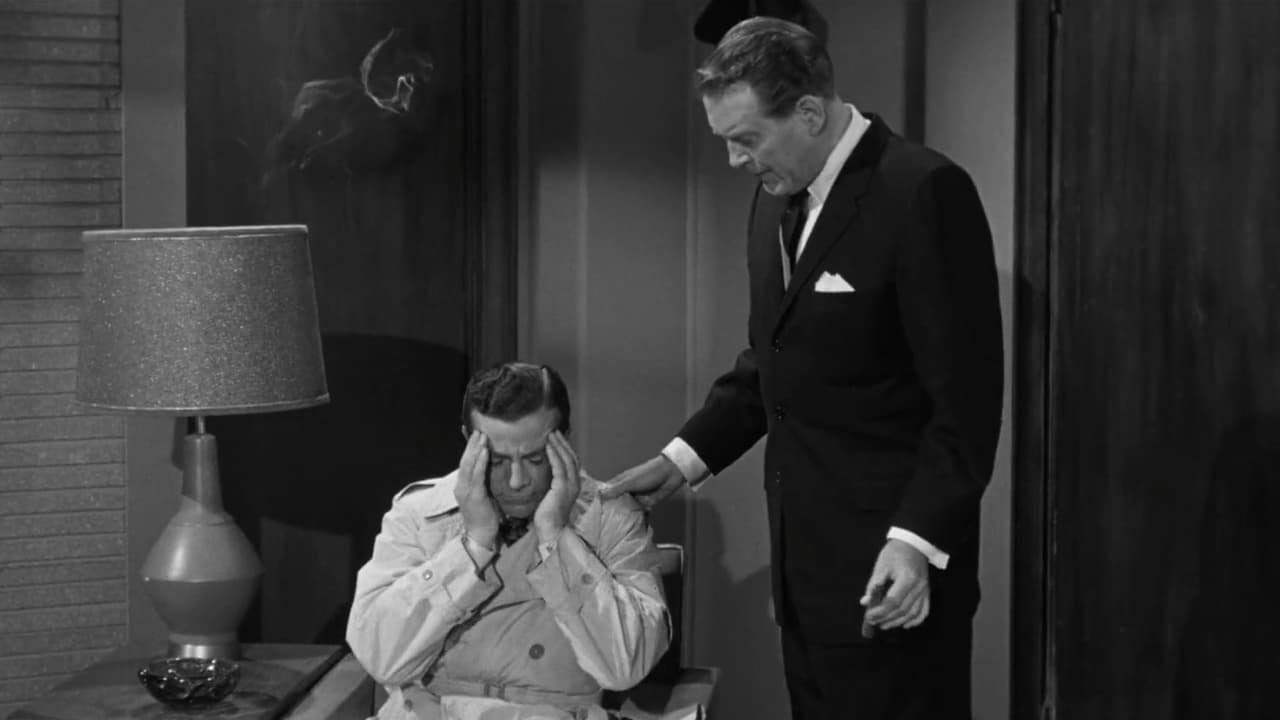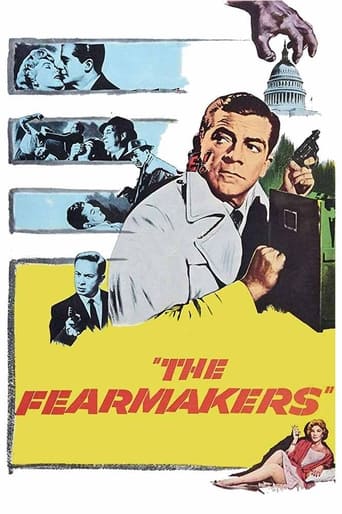

Highly Overrated But Still Good
... View MoreFun premise, good actors, bad writing. This film seemed to have potential at the beginning but it quickly devolves into a trite action film. Ultimately it's very boring.
... View MoreClever and entertaining enough to recommend even to members of the 1%
... View MoreThere is definitely an excellent idea hidden in the background of the film. Unfortunately, it's difficult to find it.
... View MoreOf the three motion pictures actor Dana Andrews starred in under the direction of Noir-Horror guru Jacques Tourneur, we'll cover two, CURSE OF THE DEMON and THE FEARMAKERS (sans the Western, CANYON PASSAGE)... So let's begin with the most obscure, and perhaps it is for a reason...Very rare a film go after the "Peace at any price" groups even and especially the 1950's when not a (for example and unrelated to this particular movie) science- fiction flick played out without a hidden or not so subtle message against nuclear weapons – and FEARMAKERS is a reverse sermon in a vacuum, beginning with a low-budget, rushed version of patriotism about as obvious as Michael Rennie leaving Earth following his Martian State of the Union Address...But enough of all that... FEAR is no space movie or a Film Noir despite one of that genre's signature leading men from LAURA, FALLEN ANGEL, BOOMERANG, DAISY KENYON, WHERE THE SIDEWALK ENDS, and especially OUT OF THE PAST director Jacques Tourneur, who Andrews requested after the surprise success and worthy turnout of their first collaboration (reviewed below) the year before, CURSE OF THE DEMON...Our heroic when tortured after being captured in Korea war-vet Andrews has a horrible fake-looking beard in the prologue – and thereafter flashbacks – and it's nice to see him all cleaned up and suited, back home, processed by the Army as sane (despite reoccurring dizzy spells), ready to dive back into work – his own business: A somewhat complicated operation that has a big surprise waiting, and it's no party...At first viewing the plot runs in talky circles and depending on prior knowledge of the "Public Relations Business" of Public Opinion Polls, Consumer Analyses, Industrial Research, Census and Surveys, it really needs some paying attention to...The movie does almost entirely through dialogue what Noir handles with guns and shadows, alleyways and romantic entanglements...After finding out that, while imprisoned overseas, his business partner died in a car accident right after selling the company to a man so obviously crooked he'd need a spinal shoehorn to stand erect, Andrews spends the rest of the picture figuring things out... When he gets word at a restaurant that his new boss may have something to hide, it takes two conversations with two different men – both very similar except one really gets the ball rolling, involving a possible murder...The pace picks up later as the plot clears, and it's not Andrews, looking much healthier and somewhat back to his 1940's dapper style than most of his other 50's B-Pictures, nor is it moon-faced beauty Marilee Earle as secretary/inside-gal Vivian that truly makes this flawed yet entertaining programmer shine...Musician Mel Torme as office dweeb Barney Bond completely owns his scenes, which happen to be the most intriguing as they involve either Dick Foran as the gentleman heavy, or Vivian, or both – with Andrews playing a kind of parenthetical cat and mouse in-between, knowing the business better than anyone and realizing those otherwise kindhearted D.C. idealists are being used as pawns ("useful idiots"), selling their own in-pocket politician through the manipulation of public opinion: Thus, Mel Torme's Barney (foreshadowing Rick Moranis in GHOSTBUSTERS, only more mellow and subtle) knows almost as much as Andrews, and far more than Foran (aided by a big thug henchman), who uses the put-upon, spectacle-wearing underling to weasel back information – but what makes Torme's character stand-out also sets him over the edge, and in that, he eventually "chews up the scenery" yet in a wonderful b-movie fashion...The dwarfish geek lusts for Dana's smitten Girl Friday, while feeling sorry for himself, with a shaky gun at one point, and don't expect a bombastic climax: FEARMAKERS, unlike most of Tourneur's more atmospheric, multi-layered ventures, is basically a Cold War Thriller's desk job. But how the papers are shuffled, as described smoothly by Andrews, is the key in this obscure vehicle that's much better the second or third time around.
... View MoreOverlooked when first released among the mass of Red Scare pictures, in retrospect, it was ingenious (not to mention prescient) to treat this theme in the form of a corporate thriller. That said, Dick Foran's ruthless villain-in-a-suit is kind of weak (given the title), especially since he is flanked by such stereotypes as burly thug and fidgety geek (effectively played by crooner Mel Torme')! On the other hand, Tourneur regular Dana Andrews (for whom he had just starred in the occult masterpiece NIGHT OF THE DEMON [1957]) is in good form as the distraught Korean War veteran met with betrayal and hostility when trying to return to his job as an honest pollster. Aiding him is an elderly statesman, a crusading journalist (who actually does very little to further his cause!) and Foran's sweet-natured secretary (who obviously feels, and then falls, for our hero). Though not exactly a noir, the pervading mood of this one is quite similar (in fact, it proved to be the director's last in that style) in view of the double-crosses, the investigation, the beatings and the seediness of some of its settings.As a sop to the superiority of the American Way (and the integrity of decent folk), the climax takes place beside Washington's famed Lincoln memorial – with Andrews felling Foran via a series of karate chops (perhaps a nod to BAD DAY AT BLACK ROCK [1955]). This, however, rather suggests that the former ultimately benefited from his tenure as a P.O.W. in the hands of the Chinese (incidentally, the film came out a good four years before THE MANCHURIAN CANDIDATE [1962])! Ultimately, therefore, once one gets past the disappointment that this is not going to deliver on the promise of brainwashing episodes displayed in the opening credits, this emerges an above average thriller nevertheless.
... View MoreThe real irony, when viewing this film, is the way it views those who lobby for special interests in Washington (and the "marketing" of candidates, skewing polling data to achieve the desired results whether the sampling or data is fair or not) has become the norm in our own era. Hence, the villain in this film is pretty much doing the same sort of thing a Karl Rove does now, but we've just changed our perspective on it. The film purports a high tone of moral outrage at political practices which completely dominate our own time.That to me is the most fascinating thing about this film (which is well-made in a clearly B-picture sort of way: not too many sets, a conspicuously minor set of actors except for Dana Andrews--though I agree with others posting here that Mel Torme's performance is a standout--and a certain unadventurousness in the visuals and pacing, despite Tourneur's presence at the helm). By watching the film, we are made aware just how much we've come to accept certain the vast "untruthfulness" or immorality of the way politicians are marketed and elected. It's as though all of the things deplored in this film have completely become "business as usual" in our time, seemingly because the desire to operate this way in politics has survived tenaciously despite the occasional railing against it the way this film does. These days you might hear objections from alternate news sources or fringe publications to this type of deceptive political lobbying and marketing, but other than that it's clearly our daily contemporary political reality being objected to so strenuously 45 years ago in THE FEARMAKERS. While the film unfolds tightly and economically enough, it does suffer from a certain "pat-ness" concerning the plot coincidences concerning the doctor character Andrews meets on the plane at the beginning of the film. That whole subplot unfolds too easily within the overall story, as though the already claustrophobically tiny world of the characters of this movie couldn't possibly expand enough for some randomness or ambiguity between it's small ensemble of characters. Is there no-one in Washington who isn't in some way related to this plot? If memory serves, I don't believe there is ever a line spoken by anyone in this film who is not in some way part of the web of characters involved somehow for or against the unfolding scam, even though we are in cabs, in hotels, in a boarding house, on a plane, and in the city of Washington, throughout.Still, it's worth the time invested, and presents a curiously brusque performance by Andrews. His character is supposed to be tired and unstable after his ordeal in Korea, and yet it's difficult to know whether the occasionally zombie-like performance of Andrews in this film is entirely intentional. The actor himself seems fatigued and lethargic at times-- is that all for the sake of the character? But there are enough little twists and surprises in this film to hold our interest, and if the film feels at time like an extended episode of the old Perry Mason TV series, that's not necessarily a bad thing if you like that sort of presentation (as I admittedly do).I'd also agree with others here that this is a film ripe for a remake, although there is no doubt it would be a COMPLETELY different movie, with a completely different moral sense.
... View MoreIn the late 1950s, The Fearmakers was a late entry in the Red Scare cycle. By the late 1960s it would have looked like a bizarre and ancient relic. Now in the 21st century, the film looks almost prophetic--if you can overlook the fact that it's basically a pro-nuclear war film. What gives the film resonance for a contemporary audience is its accurate portrayal of 'public relations', polling and advertising, and their ability to sway public opinion. In the 1950s this thesis no doubt took a back seat to the usual Commie-bashing, but now--in the era of push polls, straw polls, and exit polls-- it looks frighteningly accurate. Dana Andrews is excellent as usual. Sadly he is paired up with Marilee Earle as his love interest, and Ms. Earle gives a wooden performance of truly Redwoodian proportions. This was the last film of her brief career.
... View More